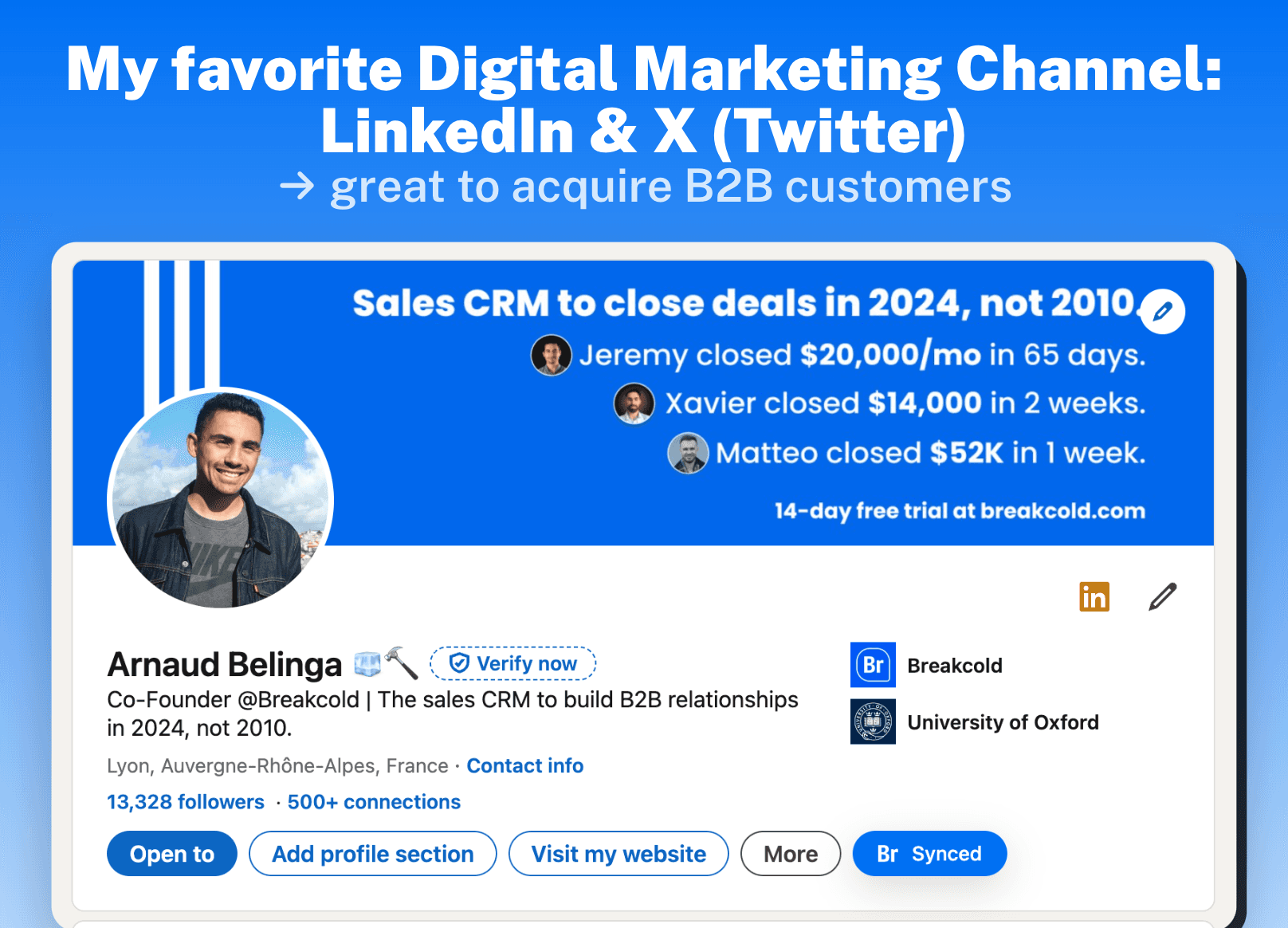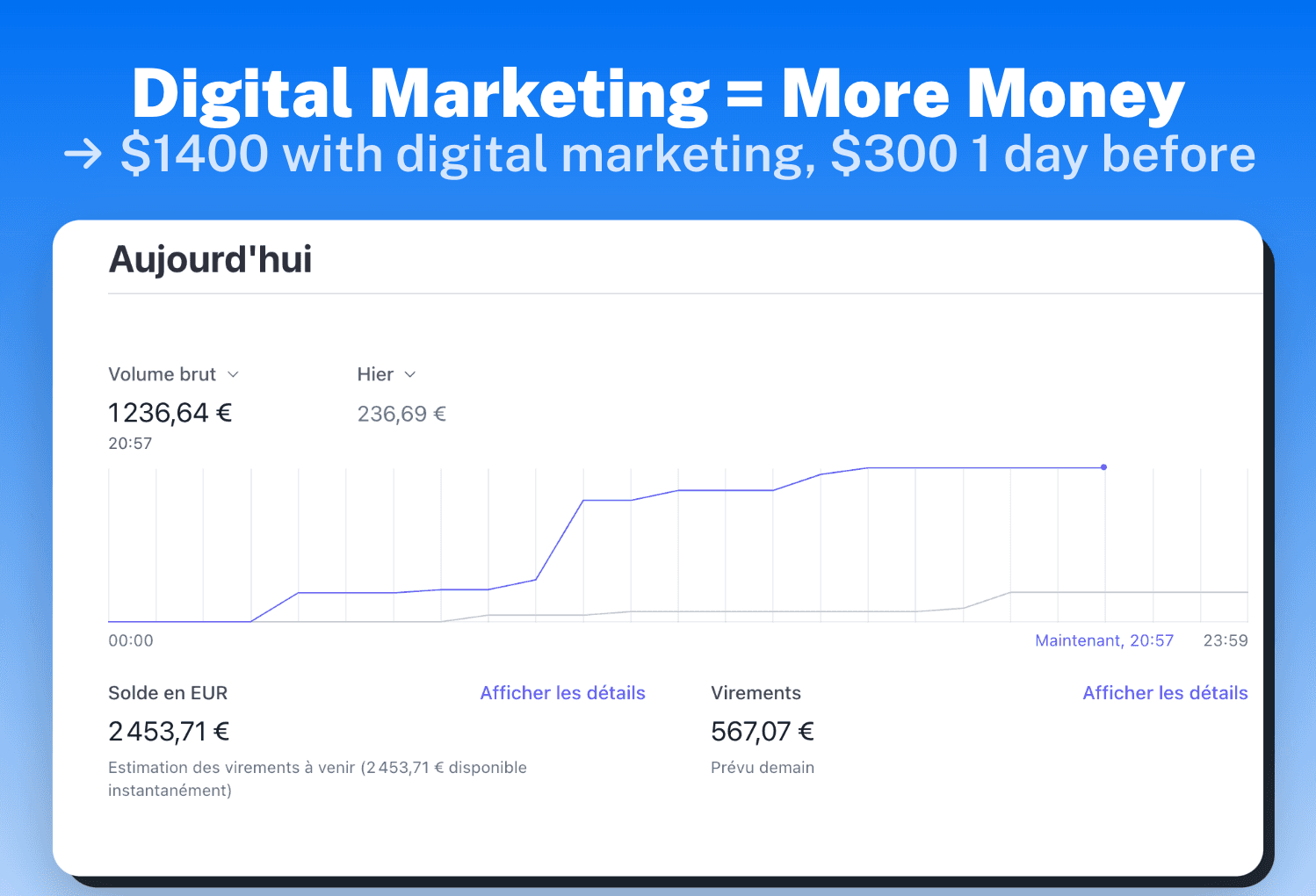
What is Digital Marketing? (Explained With Examples)
In today's digital age, marketing has taken on a whole new dimension. Traditional marketing methods, such as billboards and print ads, have given way to a more dynamic and targeted approach known as digital marketing. But what exactly is digital marketing and how does it work? In this article, we will delve deep into the world of digital marketing and explore its various aspects, backed by real-life examples
1°) What is Digital Marketing?
Digital marketing can be defined as the practice of promoting products or services using digital technologies. These technologies include the internet, mobile devices, social media platforms, search engines, and email marketing, among others. Unlike traditional marketing methods, which often rely on one-way communication, digital marketing allows for interactive and targeted advertising, making it highly effective in reaching specific audiences.
But what exactly does digital marketing entail? Let's dive deeper into the definition and explore the various aspects that make up this dynamic field.

1.1 - Definition of Digital Marketing
At its core, digital marketing involves leveraging various online channels to connect with potential customers and persuade them to take a desired action. Whether it's making a purchase, subscribing to a newsletter, or even just sharing their contact information, digital marketing aims to drive measurable results by engaging audiences in a personalized way.
But digital marketing is not limited to just one or two channels. It encompasses a wide range of tactics and strategies that businesses can utilize to achieve their marketing goals. These include:
Search Engine Optimization (SEO): Optimizing websites and content to rank higher in search engine results.
Pay-Per-Click (PPC) Advertising: Placing ads on search engines and social media platforms and paying only when users click on them.
Social Media Marketing: Utilizing social media platforms to build brand awareness, engage with customers, and drive website traffic.
Email Marketing: Sending targeted emails to nurture leads and convert them into customers.
Content Marketing: Creating and distributing valuable content to attract and retain a clearly defined audience.
Affiliate Marketing: Partnering with other businesses or influencers to promote products or services in exchange for a commission.
These are just a few examples of the many digital marketing strategies available. The key is to identify the most effective channels and tactics for your specific business and target audience.

1.2 - Advantages of Digital Marketing
One of the major advantages of digital marketing is its ability to reach a global audience. With a well-executed digital marketing strategy, businesses can target specific demographics and geographic locations, maximizing their reach and impact. This level of precision targeting ensures that marketing efforts are not wasted on irrelevant audiences.
Additionally, digital marketing allows for real-time tracking and analysis, enabling businesses to make data-driven decisions and optimize their campaigns for better performance. With the help of analytics tools, marketers can measure the effectiveness of their campaigns, track user behavior, and gain valuable insights into customer preferences and trends. This data-driven approach helps businesses refine their strategies and allocate resources more efficiently.

Another significant advantage of digital marketing is its cost-effectiveness. This is especially true for businesses managing a B2B SaaS marketing budget, where every dollar needs to count. Compared to traditional marketing methods, such as print ads or TV commercials, digital marketing offers a more affordable option for businesses of all sizes. Small startups, for example, can compete with larger corporations by utilizing digital marketing strategies that fit within their budget constraints. This level playing field allows businesses to allocate their resources wisely and achieve a higher return on investment.
1.3 - Disadvantages of Digital Marketing
While digital marketing has many benefits, it's not without its drawbacks. One of the main challenges is the ever-changing digital landscape. As technology advances and consumer behavior evolves, businesses need to stay on top of the latest trends and adapt their strategies accordingly. This requires continuous learning and investment in resources.
Moreover, the digital space is crowded with content and advertisements, leading to information overload. With the vast amount of content available online, it can be challenging for businesses to cut through the noise and capture the attention of their target audience. Effective digital marketing strategies must be tailored to stand out and provide unique value to consumers. This requires creativity, innovation, and a deep understanding of the target audience's needs and preferences.
In conclusion, digital marketing is a multifaceted discipline that encompasses various online channels and strategies. It offers businesses the opportunity to connect with their target audience in a more personalized and interactive way. By leveraging the power of digital technologies, businesses can reach a global audience, track their marketing efforts in real-time, and achieve cost-effective results. However, it is important to stay adaptable and continuously refine strategies to keep up with the ever-changing digital landscape.
2°) Examples of Digital Marketing
Now that we have a clear understanding of what digital marketing is, let's explore some real-life examples to illustrate its practical application across different contexts.
2.1 - Example in a Startup Context
Imagine a tech startup launching a new app. To gain traction and attract users, the startup could utilize social media platforms like Facebook and Instagram to create targeted ad campaigns. By identifying their ideal user persona and leveraging data-driven insights, they can reach the right audience at the right time, increasing their chances of app downloads and user engagement.
In addition, the startup could also implement search engine optimization (SEO) strategies to improve their app's visibility in organic search results. By optimizing their app's website and content with relevant keywords, meta tags, and backlinks, they can increase their chances of ranking higher on search engine results pages (SERPs). This would lead to increased organic traffic and potential app downloads.
Furthermore, the startup could collaborate with influencers or industry experts to promote their app. By leveraging the influencers' large following and credibility, the startup can tap into their audience and generate buzz around their app. This can result in increased brand awareness and potential user acquisition.
2.2 - Example in a Consulting Context
A consulting firm specializing in business strategy could use digital marketing techniques to position themselves as industry thought leaders. They could create and share valuable content, such as blog posts and whitepapers, that address common challenges faced by businesses.
In addition to content creation, the consulting firm could also leverage social media platforms to amplify their reach and engage with their target audience. By sharing their expertise through platforms like LinkedIn and Twitter, they can establish themselves as trusted advisors and attract potential clients.
Moreover, the consulting firm could utilize email marketing campaigns to nurture leads and build relationships with potential clients. By sending personalized and relevant content to their email subscribers, they can stay top-of-mind and increase the likelihood of converting leads into paying clients.
2.3 - Example in a Digital Marketing Agency Context
As a digital marketing agency, let's say you are helping a client with lead generation. Using paid advertising platforms like Google AdWords, you can create targeted campaigns that appear when potential customers search for relevant keywords.
In addition to search engine advertising, you could also implement social media advertising strategies to reach a wider audience. Platforms like Facebook, Instagram, and LinkedIn offer advanced targeting options that allow you to reach specific demographics, interests, and behaviors.
To optimize the client's lead generation efforts, you could implement marketing automation tools. By setting up automated email sequences, lead scoring systems, and CRM integrations, you can streamline the lead nurturing process and improve conversion rates.
2.4 - Example with Analogies
Lastly, to simplify the concept of digital marketing further, let's use analogies. Think of digital marketing as a toolbox filled with various tools. Each tool serves a different purpose, just like the different channels and strategies in digital marketing. Just as a carpenter selects the right tool for a specific task, businesses need to choose the appropriate digital marketing tools to achieve their goals effectively.
For example, search engine optimization (SEO) can be compared to a hammer, as it helps businesses drive organic traffic and improve their online visibility. Social media marketing can be likened to a megaphone, allowing businesses to amplify their message and engage with their audience on a larger scale. Pay-per-click advertising can be seen as a power drill, enabling businesses to quickly and efficiently target specific keywords and drive immediate results.
By understanding these analogies, businesses can better grasp the importance of selecting the right digital marketing tools and strategies to achieve their objectives effectively.
In conclusion, digital marketing has revolutionized the way businesses connect with their audiences. Through its interactive and targeted nature, digital marketing offers numerous advantages over traditional marketing methods. However, it also comes with challenges that require continuous learning and adaptation. By understanding digital marketing concepts and exploring real-life examples, businesses can make informed decisions and harness the power of digital marketing to achieve their objectives.











































































































































































































